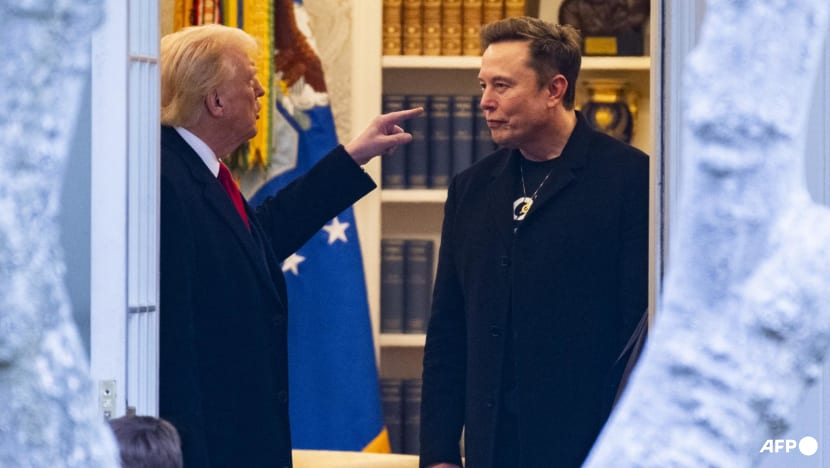In row with Trump, SpaceX chief Musk says will end critical US spaceship programme

US President Donald Trump speaks with Elon Musk (right) before departing the White House on his way to his South Florida home in Mar-a-Lago in Florida on Mar 14, 2025. (File photo: AFP/Roberto Schmidt)
WASHINGTON: SpaceX chief Elon Musk said on Thursday (Jun 5) he would begin "decommissioning" his company's Dragon spacecraft - vital for ferrying NASA astronauts to and from the International Space Station - after US President Donald Trump threatened to terminate his government contracts.
"In light of the President's statement about cancellation of my government contracts, @SpaceX will begin decommissioning its Dragon spacecraft immediately," Musk wrote on X.
The comments came after Trump and Musk's nearly year-long political alliance imploded in spectacular fashion, with the two trading public insults on social media.
The fate of roughly US$22 billion worth of SpaceX's government contracts is at risk in the fallout of a worsening fight between Musk and Trump over the administration's spending bill.
Hours later, however, Musk appeared to reverse course. Responding to a follower on X urging him and Trump to "cool off and take a step back for a couple of days", Musk wrote: "Good advice. Ok, we won't decommission Dragon."
Still, Musk's mere threat to abruptly pull its Dragon spacecraft out of service marked an unprecedented outburst from one of NASA's leading commercial partners.
SpaceX's Crew Dragon - a gumdrop-shaped capsule that flies atop a Falcon 9 rocket and splashes down in the ocean - is currently the only US spacecraft certified to carry crew to the ISS under a contract worth more than US$4.9 billion.
A variant, Cargo Dragon, delivers supplies, as the name suggests.
Following Musk's announcement, NASA spokeswoman Bethany Stevens said on X that the government space agency would "continue to execute upon the President's vision for the future of space".
"We will continue to work with our industry partners to ensure the President's objectives in space are met," she said.
The feud raised questions about how far Trump, an often unpredictable force who has intervened in past procurement efforts, would go to punish Musk, who until last week headed Trump's initiative to downsize the federal government.
If the president prioritised political retaliation and canceled billions of dollars of SpaceX contracts with NASA and the Pentagon, it could slow US space progress.
SpaceX has won US$15 billion worth of contracts from NASA as the agency relies on Dragon, puts many of its science payloads and spacecraft on the company's Falcon 9 rocket and helps fund development of SpaceX's Starship, which is poised to land NASA astronauts on the moon this decade.
At the Pentagon, SpaceX's rocket launch business is crucial for putting national security satellites in space. SpaceX's military satellite unit is building a massive spy constellation in orbit for a US intelligence agency.
Taking Dragon out of service would likely disrupt the ISS programme, which involves dozens of countries under a two-decades-old international agreement, but it was unclear how quickly such a decommissioning would occur.
Musk has been looking to retire Dragon for years in order to prioritise Starship as the company's flagship human spaceflight vessel. In 2022, SpaceX opted to halt Dragon production, capping its fleet at four before NASA urged the company to build more as Boeing's Starliner capsule struggles in development.
NASA had hoped to certify the Starliner for crewed missions, but that programme has faced severe delays.
Its most recent test flight last year ended in failure after the spacecraft experienced propulsion issues en route to the orbital lab with its first astronaut crew.
The Starliner ultimately returned to Earth empty, while the two astronauts were brought home by SpaceX earlier this year.
Crew Dragon's certification in 2020 ended nearly a decade of US reliance on Russian Soyuz rockets to transport astronauts following the retirement of the Space Shuttle programme in 2011.
American astronauts still fly aboard Soyuz rockets, while Russian cosmonauts ride on Crew Dragons under a long-standing seat-swap agreement.
In addition to NASA missions, Crew Dragon also flies private missions - most recently Fram2, which carried tourists over the Earth's poles.
The next scheduled crew launch is Tuesday's Axiom-4 mission, which will see a Crew Dragon transport astronauts from India, Poland, and Hungary to the ISS.














